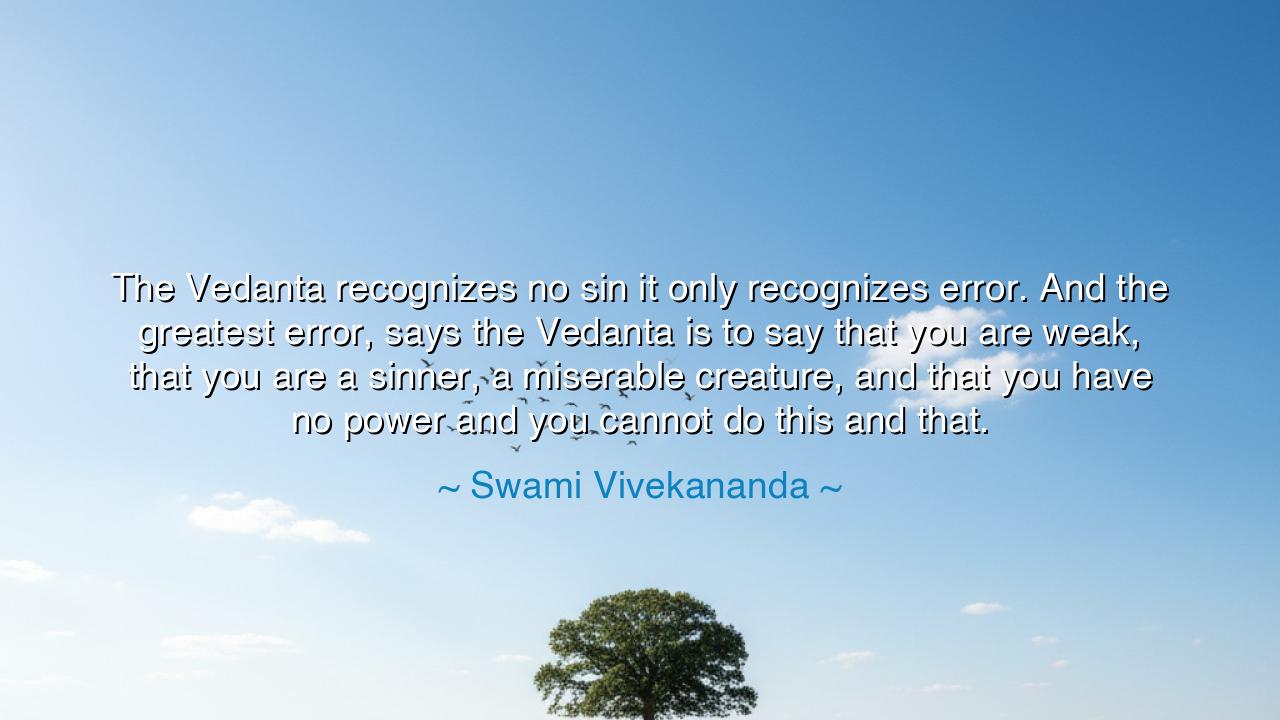
The Vedanta recognizes no sin it only recognizes error. And the
The Vedanta recognizes no sin it only recognizes error. And the greatest error, says the Vedanta is to say that you are weak, that you are a sinner, a miserable creature, and that you have no power and you cannot do this and that.






Hearken, O children of the ages, to the luminous words of Swami Vivekananda, who unveils the eternal truth of the Vedanta: it recognizes not the chains of sin, but the illusions of error. He teaches that the soul is not inherently weak, nor destined to suffer under guilt or despair. The greatest folly, the deepest error, is to declare oneself powerless, sinful, or miserable, and thus to obscure the latent strength that lies within. In this, Vivekananda calls us to awaken to the divine potential that sleeps in every heart.
The Vedanta sees all limitation as illusion, a veil cast by ignorance and self-doubt. To call oneself weak is to deny the power bestowed by the cosmos, to obscure the boundless energy inherent in the human spirit. Vivekananda exhorts his disciples to cast aside these falsehoods, to recognize that courage, virtue, and mastery are not granted from without, but arise from within. The error of self-condemnation is the heaviest burden a soul may carry, yet it can be lifted by knowledge, resolve, and faith in one’s own capacity.
Consider the life of Mahatma Gandhi, who, in the face of seemingly insurmountable oppression, refused to accept the notion that he was powerless. Though a single man against an empire, he embodied the Vedantic teaching that error lies not in circumstance, but in the belief in one’s own weakness. By embracing his inner strength and moral clarity, he awakened millions, and through peaceful resolve, reshaped the destiny of a nation.
Vivekananda’s words resonate beyond the deeds of saints and heroes; they speak to every seeker. Each act of courage, each pursuit of knowledge, each striving to overcome limitation is a victory over the error of self-doubt. To believe in sin or inherent weakness is to blind oneself to the divine potential residing in every human heart. The Vedanta teaches that liberation and accomplishment arise from the realization of this truth.
O children of the future, carry this teaching in your hearts: deny not your power, disdain not your capacity, and renounce the chains of imagined sin. Stand firm in the awareness that within you lies the might to act, to create, to endure, and to transform. The greatest error is not failure, but the surrender to the falsehood that one is weak. In the awakening to your own strength, you touch the eternal, and the world becomes a field for your courage and wisdom.
If you desire, I can also craft a visual, ancient scroll-style presentation of this passage to evoke the heroic and timeless resonance of Vivekananda’s teaching.






UTUyen Thu
This teaching feels radically positive, but I’d like to ask a practical question: how can someone living an ordinary life — with fears, regrets, and failures — actually live by this ideal? If all weakness is illusion, how should we confront suffering or injustice? Should we deny those experiences as unreal, or transform them through awareness? I’d love a perspective on applying this wisdom in day-to-day emotional struggles.
THThanh Huyen
I appreciate the bold optimism of this idea — that we are not sinners but simply mistaken. But does this approach underestimate the complexity of human emotions like guilt and remorse? Can personal growth really occur without acknowledging some form of moral error or regret? I’m curious whether Vedanta’s view could coexist with the need for humility and reflection on one’s wrong choices.
HThong thai
This perspective from Vivekananda feels liberating, almost like a spiritual call to self-empowerment. Yet, I can’t help but ask: how does one truly internalize this when self-doubt and guilt are such ingrained parts of human psychology? If our greatest mistake is believing we are weak, how do we reprogram our minds to see strength in ourselves even when we fail repeatedly or face external judgment?
QPQuan Phung
I find this statement deeply empowering, but I wonder — does rejecting the idea of sin entirely risk removing accountability for harmful actions? If everything is just an 'error,' does that mean moral boundaries are fluid or subjective? I’d like to understand how Vedanta balances personal responsibility with the idea that weakness or sin is merely an illusion. How can this philosophy apply to modern ethical dilemmas without excusing wrongdoing?